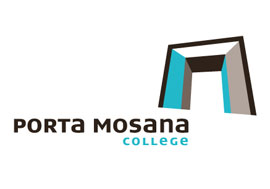Porta Mosana
The Project
The Project
Show don’t tell! SDG’s and AI: the perfect match
Porta Mosana’s bilingual department is looking for creative thinkers who can help design a set of hands on SDG’s-workshops with the use of AI. Change young pupils’ life by making this an in- and outside school learning experience!
Why? The framework of Global Citizen Education (GCE/Unesco) is a complete and hands on theoretical concept leading to measurable learning goals and recognizable skills together with the SDG’s a power house for future learning and problem solving.
The credo ‘show don’t tell’ forces educators to design new teaching strategies within the new normal of AI. A creative think- and do tank is needed to think and act towards new possibilities of using AI as a life-long learning companion enabling young people to meet ‘the other’ and avoid cultural exclusion. New generations carry the burden of tomorrow’s world and global problem-solving skills in the context of the SDG’s need to be inside the lifelong learning with AI in the 21st century education.
How? Strong developed intercultural competencies are mandatory the achieve global problem-solving skills. But how to bring this into practice within the challenges of today’s educational practice?
What? That is the challenge! Disruptive, hybrid, glocal …?
Your task is to create an AI tool-kit related to the SDG’s based on organisations, initiatives and/or recent developments that must be used by groups of year 4 pupils for their SDG challenge. The total group size is approx. 100 pupils. You will be involved in all stages of the SDG challenge and prepare their match with local problems. Working in classroom and/or via google meet are options to explore. Adaptions within the standard program based are part of the learning curve for all participants (pupils, students, teachers, academic advisor, local inhabitants). Working with an iterative learning cycle is inevitable.
Suggestions of how to use AI within the curriculum:
- Adaptive learning systems: AI can be used to adapt the learning process to students’ individual needs and abilities, allowing them to learn at their own pace.
- Automatic grading: AI can be used to automatically grade assignments and tests, saving teachers valuable time and providing students with faster feedback.
- Virtual assistants: AI can be used as virtual assistants in the classroom, providing teachers with support in answering questions and offering additional explanations.
The ideal outcome would be to find workable solutions how to deal with AI within education at all levels (curriculum design, collaboration, self-efficacy, self-regulation, authentic assessment), that as such contribute to the global quest for 21st century education. A successful project will see direct implementation within standard curriculum and we will be sharing experiences with the schoolboard (LVO) and national educational expertise centers (SLO).
Design-oriented
The Client
The Client
Global citizen education and the SDG challenge!
The bilingual department of the pre-U stream (vwo) of the Porta Mosana College (PMC) is a pre-academic track for pupils between 12 and 18 years who are planning to go to university after their graduation.
The bilingual department (tto) is leading in innovation within Porta Mosana College. Leading pedagogy is based on growth mindset (C.Dweck) and the Building Learning Power concept (G.Claxton) aiming at optimizing student learning outcomes. Leading education goals also focus on the development of a Global Citizen Education. This is a set of intercultural competencies enabling young academics to adapt to the needs of a world of diversity.
This year’s Global Perspectives lessons in year 4 are all about the Sustainable Development Goals and how we can use AI within the GP curriculum to learn how to approach 21st century sustainability issues. The GP curriculum not only aims at academic skills training (e.g. problem solving) within a classroom setting, but also aims towards the application in a real-world setting of what has been practiced at school; the SDG challenge [“Burgerschapsopdracht”].

